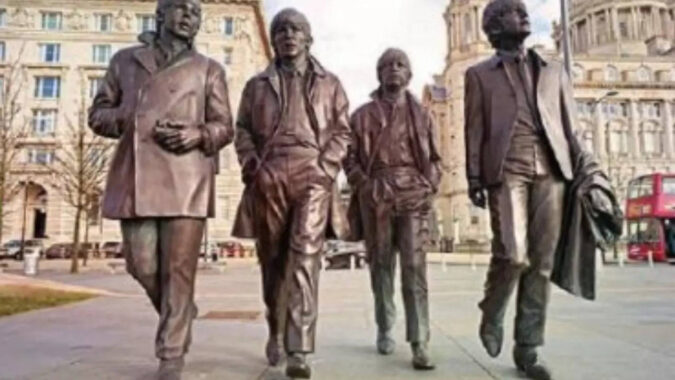When the Beatles broke up more than 50 years ago, devastated fans were left yearning for more. Now, artificial intelligence is offering just that. From “re-uniting” the Fab Four on songs from their solo careers, to re-imagining surviving superstar Paul McCartney’s later works with his voice restored to its youthful peak, the new creations show off how far this technology has come — and raise a host of ethical and legal questions.
“I’m sobbing! This is so beautiful!” read a YouTube comment for a fan-created AI cover of McCartney’s 2013 single,“New”, which features de-aged vocals and a bridge part “sung” by his great songwriting partner, the late John Lennon. Equally impressive is a version of “Grow Old With Me”, one of the last songs penned by Lennon, which was posthumously released after his 1980 murder and recently remade by an AI creator who goes by “Dae Lims”. .
After the most influential band in history parted ways acrimoniously, fans were deprived of a final “happy ending”, said music YouTuber Steve Onotera. “So when we do get that reunion artificially yet convincingly created by AI,well, it’s surprisingly emotional”. Like an earlier track called “Heart on a Sleeve” whichfeatured AI-generated vocals of Drake and The Weeknd and racked up millions of hits, thesecovers use scraping technology that analyses and captures the nuances of a particular voice.
The creators would have probably then sung the parts themselves and then applied the cloned voice, in a manner similar to placing a filter on a photo. While the results can be astonishing, getting there isn’t simple and requires skilled human operators combining new AI tools with extensive knowledge of traditional music processing software, Zohaib Ahmed, the CEO of Resemble AI, a voice cloning company, said.
For the music industry, the ramifications are enormous.
As the technology progresses, software that will easily allow people to transform their vocals into one of their favourite singers is likely not far away. “If they’re getting paid for their vocal license, hey, everyone’s happy,” said Onotera. “But what if they’re long since passed away? Is it up to their estate?” AI is already proving a helter-skelter impact on the copyright world. In the case of “Heart on a Sleeve”, Universal Music Group was quick to assert copyright claims and have the track pulled down from streaming services, but that hasn’t stopped it popping back up on small accounts.
“I’m sobbing! This is so beautiful!” read a YouTube comment for a fan-created AI cover of McCartney’s 2013 single,“New”, which features de-aged vocals and a bridge part “sung” by his great songwriting partner, the late John Lennon. Equally impressive is a version of “Grow Old With Me”, one of the last songs penned by Lennon, which was posthumously released after his 1980 murder and recently remade by an AI creator who goes by “Dae Lims”. .
After the most influential band in history parted ways acrimoniously, fans were deprived of a final “happy ending”, said music YouTuber Steve Onotera. “So when we do get that reunion artificially yet convincingly created by AI,well, it’s surprisingly emotional”. Like an earlier track called “Heart on a Sleeve” whichfeatured AI-generated vocals of Drake and The Weeknd and racked up millions of hits, thesecovers use scraping technology that analyses and captures the nuances of a particular voice.
The creators would have probably then sung the parts themselves and then applied the cloned voice, in a manner similar to placing a filter on a photo. While the results can be astonishing, getting there isn’t simple and requires skilled human operators combining new AI tools with extensive knowledge of traditional music processing software, Zohaib Ahmed, the CEO of Resemble AI, a voice cloning company, said.
For the music industry, the ramifications are enormous.
As the technology progresses, software that will easily allow people to transform their vocals into one of their favourite singers is likely not far away. “If they’re getting paid for their vocal license, hey, everyone’s happy,” said Onotera. “But what if they’re long since passed away? Is it up to their estate?” AI is already proving a helter-skelter impact on the copyright world. In the case of “Heart on a Sleeve”, Universal Music Group was quick to assert copyright claims and have the track pulled down from streaming services, but that hasn’t stopped it popping back up on small accounts.
